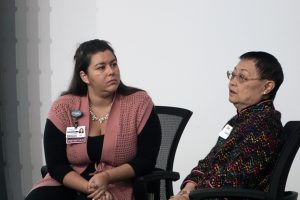West Meets East: Culture and Health forum was held on Oct. 27 to discuss what to do when communication problems arise in healthcare. The University of Indianapolis specifically targeted the aspect of culture and how it can affect the care patients receive.
Chief Academic Advisor of Community Health Network Kathleen Zoppi who spoke at the event on Crossing Cultures, meaning how one can practice being sensitive to all beliefs.
Zoppi said she prepared for her presentation by utilizing her background in talking about cultural competence or being able to interact effectively with people from other cultures. She also researched the topic further and teaching techniques that are currently being used to effectively put together her slideshow and speech.

“[My point was] that people’s individual beliefs affect the quality of their care but also need to be communicated with medical professionals so they can choose appropriately for themselves,” Zoppi said.
She said she thought her presentation was successful because of the feedback she received after playing a video that stirred conversation. The video depicted a young girl with a hole in her heart that the doctors said needed an operation. Though her condition was serious, her grandmother did not want her granddaughter to have the operation because of the cultural background and the values she held. Zoppi asked the audience what the physician did wrong in her diagnosis and the audience responded that they saw genuine disregard for the wishes of the family to attempt harmless traditional medicine first. This was the point of the forum, to expose and create awareness that one should be more culturally competent, according to Assistant Professor in the Department of Social Work Stephanie Rudd.
When Rudd became a speaker in her group workshop she had her participants undergo mind and body medicine of relaxation. They went into a relaxation and meditation session which displayed the effects of calming sounds and simple phrases.
She said her main goal in her presentation was to show that in the field of medicine, the physicians need to be colorblind and adhere to specific cultures, making sure that the patients feel respected and cared for in all practices.
Senior social work major Mariah Whitaker said she attended the session because she figured she could easily use this in her current job working at a food and clothing pantry. Dealing with a diverse selection of people, she says that it helped her be more aware of how she is going to use her tone, make sure she’s not being condescending and make sure she’s not going to be assuming one thing or another in her conversations with people.
Whitaker said the biggest thing that she took away from the day was that if a patient says they do not want to be treated or use a certain method of care, the physician should ask why. She said that this can help make doctors and patients more well informed.
“We are not a world of one kind of people, nor should we strive for people to become all the same,” Rudd said. “We really need to embrace the differences of all and be sure that their healthcare and be sure that their wishes and wants and cultural practices are observed and followed and respected.”







